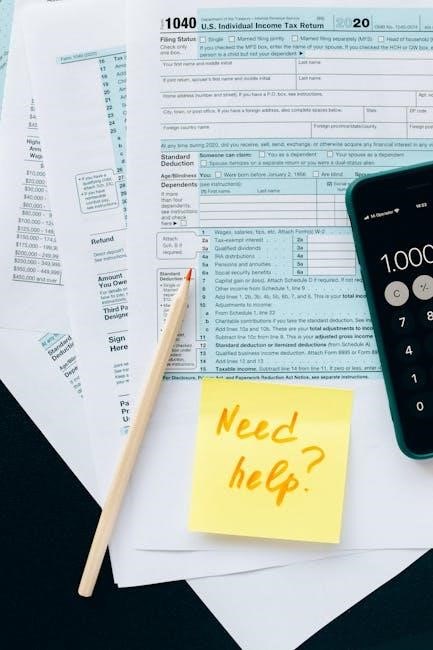A small business tax deductions worksheet helps entrepreneurs identify eligible expenses, maximizing savings and streamlining tax filing. It organizes deductions, ensuring compliance with IRS guidelines and optimizing financial records for accurate reporting.
Overview of Tax Deductions for Small Businesses
Tax deductions for small businesses reduce taxable income, lowering overall tax liability. Common deductions include business expenses, such as supplies, rent, and utilities, as well as home office deductions and travel expenses. A worksheet helps categorize these deductions, ensuring accurate reporting and compliance with IRS guidelines. Organizing expenses systematically maximizes savings and simplifies the filing process for entrepreneurs and self-employed individuals.
Importance of Using a Tax Deductions Worksheet
A tax deductions worksheet is essential for small businesses to systematically itemize and organize expenses, ensuring no eligible deductions are missed. It simplifies tracking and categorizing costs, such as operational expenses, travel costs, and home office expenses. By using a worksheet, businesses can maximize tax savings, maintain compliance with IRS requirements, and streamline the tax filing process, reducing errors and saving time.
Key Categories of Small Business Tax Deductions
Small businesses can deduct business expenses, home office costs, travel expenses, and operational costs, helping reduce taxable income and optimize financial performance effectively.
Business Expenses and Operational Costs
Business expenses and operational costs are essential deductions for small businesses, covering items like supplies, utilities, rent, and equipment. These everyday expenses reduce taxable income, helping businesses save money. Proper documentation and categorization ensure compliance with IRS rules, maximizing deductions and optimizing financial performance. Tracking these costs using a worksheet simplifies the process, making tax filing more efficient and accurate for small business owners.
Home Office Deductions and Remote Work Expenses
Home office deductions allow small businesses to deduct expenses for a dedicated workspace, such as utilities, furniture, and internet costs. Remote work expenses, like office supplies and equipment, may also qualify. Using a tax deductions worksheet helps track these expenses, ensuring compliance with IRS rules and maximizing savings. Proper documentation is key to avoiding errors and optimizing tax benefits for remote operations.
Travel and Transportation-Related Deductions
Travel and transportation expenses, such as airfare, lodging, and car mileage, are deductible for business purposes. A tax deductions worksheet helps itemize these costs, ensuring accurate reporting. Proper documentation of receipts and logs is essential to support claims, maximizing tax savings while adhering to IRS guidelines for legitimate business-related travel expenses.
Understanding the Small Business Tax Deductions Worksheet
The worksheet is a tool to systematically itemize deductions, ensuring compliance with IRS guidelines. It categorizes expenses, helping businesses maximize savings and organize financial records effectively.
Structure and Layout of the Worksheet
The worksheet is divided into sections for different expense categories, such as business operations, home office, and travel. Each section includes lines for itemizing deductions, ensuring clarity and organization. It also provides space for calculations and totals, making it easier to sum up deductions accurately. This structured format helps businesses ensure no eligible expense is overlooked.
How to itemize Deductions Effectively
Start by categorizing expenses using the worksheet, ensuring each deduction aligns with IRS guidelines. Use checklists to identify eligible items like supplies, travel, and home office costs. Organize receipts and invoices to support each claim. Review each section methodically, ensuring no valid expense is overlooked. This systematic approach maximizes savings and streamlines tax filing, while maintaining compliance with tax regulations.

Maximizing Your Tax Savings
A small business tax deductions worksheet helps systematically track and organize expenses, ensuring eligible deductions are claimed, maximizing savings, and maintaining compliance with tax regulations efficiently.
Tips for Identifying Eligible Deductions
To maximize tax savings, small businesses should track all eligible expenses using a worksheet. Common deductions include business expenses, home office costs, and travel expenses. Ensure expenses are ordinary and necessary for business operations. Depreciation on assets and certain taxes may also qualify. Consulting a tax professional can help identify often-overlooked deductions, ensuring compliance and optimizing savings.
Strategies for Organizing Financial Records
Implementing digital tools like QuickBooks or spreadsheets helps track expenses and income efficiently. Categorize transactions into business and personal to simplify deduction identification. Regularly review and update records to ensure accuracy. Store receipts and invoices digitally for easy access during tax preparation. This organized approach minimizes errors and maximizes eligible deductions, ensuring compliance with IRS requirements and streamlining the filing process.
Real-World Examples and Case Studies
Service-based businesses can deduct advertising and professional fees, while product-based businesses benefit from inventory and shipping expense write-offs, as shown in the worksheet examples.
Common Deductions for Service-Based Businesses
Service-based businesses often deduct expenses like salaries, marketing, and professional fees. Home office deductions, business use of cars, and travel expenses are also common. Additionally, bank fees, software subscriptions, and client entertainment costs may qualify. These deductions help reduce taxable income, maximizing savings for service providers, as outlined in the worksheet.
Deductions for Product-Based and Retail Businesses
Product-based and retail businesses can deduct costs like inventory, shipping, and storage. Equipment, rent, and utilities for retail spaces also qualify. Additionally, depreciation on machinery and IRS-compliant expenses like business taxes and licenses are eligible. The worksheet helps organize these deductions, ensuring accurate reporting and maximizing tax savings for product-based ventures.
IRS Guidelines and Compliance
Adhering to IRS guidelines is crucial for accurate tax deduction claims. Ensure all expenses are properly documented and comply with federal regulations to avoid audits and penalties.
Understanding IRS Requirements for Deductions
IRS guidelines specify that deductible expenses must be ordinary and necessary for business operations. Accurate documentation and categorization of expenses are essential. Eligible deductions include supplies, travel costs, and home office expenses. Using a small business tax deductions worksheet ensures compliance, helping to avoid audits and penalties by clearly tracking eligible expenses according to IRS standards.
Common Mistakes to Avoid When Filing
Common errors include improper expense categorization, missing deadlines, and overlooking eligible deductions. Ensure accurate documentation and avoid mixing personal and business expenses. Verify calculations to prevent mathematical errors. Failure to consult IRS guidelines or a tax professional can lead to penalties. Use a small business tax deductions worksheet to track expenses systematically and minimize audit risks.

The Role of Professional Advisors
Professional advisors provide expert guidance on tax strategies, ensuring compliance and maximizing deductions. They help navigate complex tax landscapes and optimize financial records for small businesses.
When to Consult a Tax Professional
Consult a tax professional when facing complex deductions, uncertain eligibility, or significant financial changes. They ensure accuracy, compliance, and maximize savings, especially for nuanced scenarios like depreciation or multi-state operations, guiding businesses through intricate tax landscapes effectively.
Benefits of Using Accounting Software
Accounting software simplifies tracking expenses, generating reports, and managing tax deductions. It automates calculations, reduces errors, and ensures compliance with IRS requirements. Features like expense categorization and real-time updates help small businesses efficiently organize financial data, making tax preparation seamless and maximizing deductions with accuracy.

State and Local Tax Considerations
State and local taxes vary, offering additional deductions for small businesses. A worksheet helps track these incentives, ensuring compliance and maximizing savings through localized tax benefits effectively.
Additional Deductions for State Taxes
Beyond federal deductions, small businesses can claim state-specific tax deductions. These may include property taxes, state income taxes, and industry-specific incentives. A worksheet helps track these deductions, ensuring compliance with state regulations. Common deductions include sales tax on business purchases and special credits for certain industries. Always verify state-specific guidelines to maximize savings and avoid missing eligible deductions.
Local Tax Incentives for Small Businesses
Local governments often offer tax incentives to support small businesses, such as property tax reductions or rebates. These incentives vary by location and may include credits for hiring local workers or investing in sustainable practices. A tax deductions worksheet can help identify and organize these local-specific deductions, ensuring businesses take full advantage of available incentives and comply with local tax regulations.
Utilizing a small business tax deductions worksheet ensures compliance and maximizes savings. Download the worksheet, organize records, and consult professionals to streamline your tax process effectively.

Final Checklist for Tax Deductions
A comprehensive checklist ensures no deduction is missed. Review business expenses, home office costs, travel logs, and financial records. Verify eligibility under IRS guidelines, organize receipts, and consult professionals if needed. Ensure accuracy in calculations and adherence to deadlines for a seamless tax filing process, maximizing your refund and minimizing audit risks effectively.
How to Download and Use the Worksheet
Access the small business tax deductions worksheet PDF online, ensuring compatibility with your device. Fill in sections systematically, categorizing expenses like operational costs, home office deductions, and travel expenses. Use the worksheet to itemize deductions accurately, referencing IRS guidelines for eligibility. Regularly update and review the document to ensure compliance and maximize tax savings throughout the financial year.
